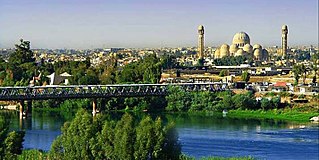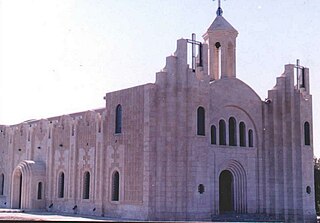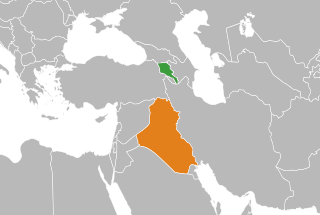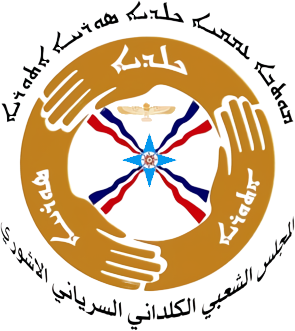
Mosul is a major city in northern Iraq, serving as the capital of Nineveh Governorate. The city is considered the second-largest city in Iraq in terms of population and area after the capital Baghdad. Mosul is approximately 400 km (250 mi) north of Baghdad on the Tigris river. The Mosul metropolitan area has grown from the old city on the western side to encompass substantial areas on both the "Left Bank" and the "Right Bank", as locals call the two riverbanks. Mosul encloses the ruins of the ancient Assyrian city of Nineveh – once the largest city in the world – on its east side.

Nineveh or Ninawa Governorate is a governorate in northern Iraq. It has an area of 37,323 km2 (14,410 sq mi) and an estimated population of 2,453,000 people as of 2003. Its largest city and provincial capital is Mosul, which lies across the Tigris river from the ruins of ancient Nineveh. Before 1976, it was called Mosul Province and included the present-day Dohuk Governorate. The second largest city is Tal Afar, which has an almost exclusively Turkmen population.

Ankawa is a suburb of Erbil in the Kurdistan Region of Iraq. It is located 8 kilometres (5 mi) northwest of downtown Erbil. The suburb is predominantly populated by Assyrians, most of whom adhere to the Chaldean Catholic Church.
Karamlesh is a town in northern Iraq located less than 18 miles (29 km) south east of Mosul.

Bartella is a town that is located in the Nineveh Plains in northern Iraq, about 21 kilometres east of Mosul.

Qaraqosh, is an Assyrian city in the Nineveh Governorate, of Iraq located about 32 kilometres (20 mi) southeast of the city of Mosul and 60 kilometres (37 mi) west of Erbil amid agricultural lands, close to the ruins of the ancient Assyrian cities Kalhu and Nineveh.

Iraqi Assyrians are an ethnic and linguistic minority group, indigenous to Upper Mesopotamia. Assyrians in Iraq are those Assyrians still residing in the country of Iraq, and those in the Assyrian diaspora who are of Iraqi-Assyrian heritage. They share a common history and ethnic identity, rooted in shared linguistic, cultural and religious traditions, with Assyrians in Iran, Assyrians in Turkey and Assyrians in Syria, as well as with the Assyrian diaspora. Assyrian diaspora in Detroit, Areas with large expat populations include Chicago and Sydney.

The Assyrian homeland, Assyria, refers to the homeland of the Assyrian people within which Assyrian civilisation developed, located in their indigenous Upper Mesopotamia. The territory that forms the Assyrian homeland is, similarly to the rest of Mesopotamia, currently divided between present-day Iraq, Turkey, Iran and Syria. In Iran, the Urmia Plain forms a thin margin of the ancestral Assyrian homeland in the north-west, and the only section of the Assyrian homeland beyond the Mesopotamian region. The majority of Assyrians in Iran currently reside in the capital city, Tehran.

Iraqi Armenians are Iraqi citizens and residents of Armenian ethnicity. Many Armenians settled in Iraq after fleeing the 1915 Armenian genocide. It is estimated that there are 10,000–20,000 Armenians living in Iraq, with communities in Baghdad, Mosul, Basra, Kirkuk, Baqubah, Dohuk, Zakho and Avzrog.

Nineveh Plains is a region in Nineveh Governorate in Iraq, to the north and east of the city Mosul. Control over the region is contested between Iraqi security forces, KRG security forces, Assyrian security forces, Babylon Brigade and the Shabak Militia.

The Christians of Iraq are considered to be one of the oldest continuous Christian communities in the world.
The Qaraqosh Protection Committee is an armed militia formed by Assyrians living in the city of Bakhdida, in Ninawa Governorate of Iraq. The committee, formed in 2004, was organized through local churches, and began manning checkpoints and was soon working with the Iraqi police.
2008 attacks on Christians in Mosul was a series of attacks which targeted Iraqi Christians in Mosul, Iraq. The Christians of Mosul, who were already targeted during the Iraq War, left the city en masse heading to Assyrian villages in Nineveh Plains and Iraqi Kurdistan. Both Sunni extremists, and Kurdish Peshmerga were blamed for the attacks.

The Chaldean Syriac Assyrian Popular Council, popularly known as Motwa, is a political party in Iraq, that was founded in 2007, on the initiative of Sarkis Aghajan, a high-ranking member of the Kurdistan Democratic Party. As a party that represents minority communities, CSAPC participated in several elections, both on national, regional and local levels, mainly in various coalitions with other minority parties. The current president of the party is Jameel Zaito.
Puerto Baní Stadium is a stadium in Baní, Dominican Republic. It is primarily used for baseball and has a capacity of 25,000 spectators. The stadium was opened in 2012.

Bashiqa is a town situated at the heart of the Nineveh plain, between Mosul and Sheikhan, on the edges of Mount Maqlub.

Tel Keppe is a town in northern Iraq. It is located in the Nineveh Governorate, less than 8 mi (13 km) northeast of Mosul.
Rise Up is a 2007 documentary film by director and cinematographer Luciano Blotta. The film documents the world of underground music in Jamaica following the efforts of three musicians to break into the mainstream, and vicariously exploring a variety of socio-cultural issues relating to poverty, violence, and post-colonial corruption.
The persecution of Christians by the Islamic State involves the systematic mass murder of Christian minorities, within the regions of Iraq, Syria, Egypt and Libya controlled by the Islamic terrorist group Islamic State. Persecution of Christian minorities climaxed following the Syrian civil war and later by its spillover.

The Nineveh Plain Forces or NPF was a military organization that was formed on 6 January 2015 by the indigenous Christian Assyrian people in Iraq, in cooperation with Peshmerga, to defend against Islamic State. The Nineveh Plains is a region at the heart of the Assyrian homeland. The militia is affiliated with the Bet-Nahrain Democratic Party and the Beth Nahrain Patriotic Union (HBA), the latter being part of the secular Dawronoye movement. It participated in the Battle of Mosul (2016–2017).












